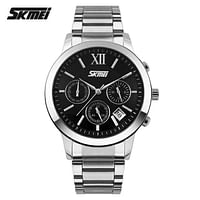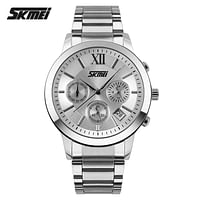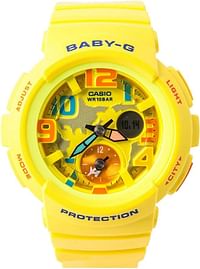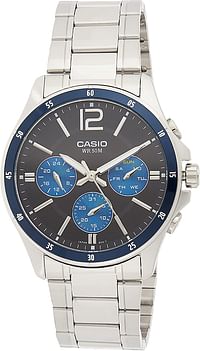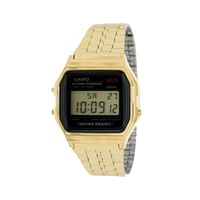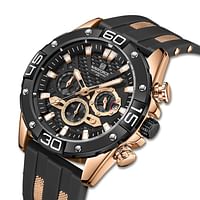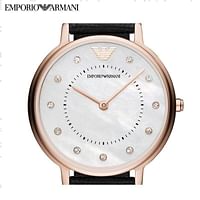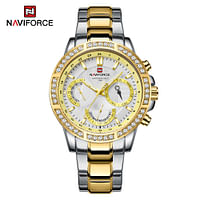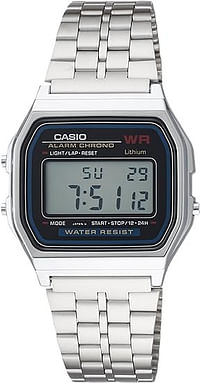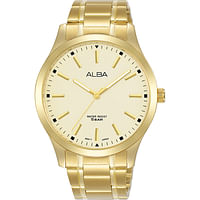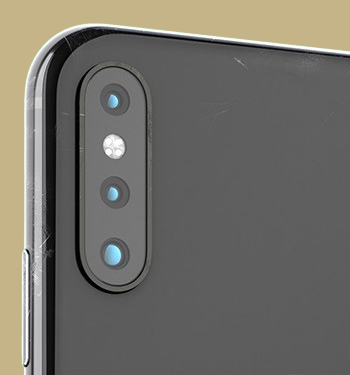
What does "Never Used | All New" condition mean at Cartlow?
Why are Cartlow’s prices lower than the market?
What is Cartlow’s Best Price Guarantee?
What warranty does Cartlow offer on its products?
Can I return this product to Cartlow if not satisfied?
Men's Stainless Steel Analog+Digital Wrist Watch NF9189 S/BE
The name says it all! A Never Used All New item, comes in its sealed original packaging with all original accessories.
About this product
| Highlights |
|
Overview
A watch is a portable timepiece intended to be carried or worn by a person. It is designed to keep a consistent movement despite the motions caused by the person's activities. A wristwatch is designed to be worn around the wrist, attached by a watch strap or other type of bracelet, including metal bands, leather straps, or any other kind of bracelet. A pocket watch is designed for a person to carry in a pocket, often attached to a chain. Watches were developed in the 17th century from spring-powered clocks, which appeared as early as the 14th century. During most of its history, the watch was a mechanical device, driven by clockwork, powered by winding a mainspring, and keeping time with an oscillating balance wheel. These are called mechanical watches. In the 1960s, the electronic quartz watch was invented, which was powered by a battery and kept time with a vibrating quartz crystal. By the 1980s, the quartz watch had taken over most of the market from the mechanical watch. Historically, this is called the quartz revolution (also known as the quartz crisis in Switzerland). Developments in the 2010s include smartwatches, which are elaborate computer-like electronic devices designed to be worn on a wrist. They generally incorporate timekeeping functions, but these are only a small subset of the smartwatch's facilities. In general, modern watches often display the day, date, month, and year. For mechanical watches, various extra features called "complications," such as moon-phase displays and the different types of tourbillon, are sometimes included. Most electronic quartz watches, on the other hand, include time-related features such as timers, chronographs, and alarm functions. Furthermore, some modern watches (like smartwatches) even incorporate calculators, GPS and Bluetooth technology or have heart-rate monitoring capabilities, and some of them use radio clock technology to regularly correct the time.
What does "Never Used | All New" condition mean at Cartlow?
Why are Cartlow’s prices lower than the market?
What is Cartlow’s Best Price Guarantee?
What warranty does Cartlow offer on its products?
Can I return this product to Cartlow if not satisfied?
About this product
| Highlights |
|
Overview
A watch is a portable timepiece intended to be carried or worn by a person. It is designed to keep a consistent movement despite the motions caused by the person's activities. A wristwatch is designed to be worn around the wrist, attached by a watch strap or other type of bracelet, including metal bands, leather straps, or any other kind of bracelet. A pocket watch is designed for a person to carry in a pocket, often attached to a chain. Watches were developed in the 17th century from spring-powered clocks, which appeared as early as the 14th century. During most of its history, the watch was a mechanical device, driven by clockwork, powered by winding a mainspring, and keeping time with an oscillating balance wheel. These are called mechanical watches. In the 1960s, the electronic quartz watch was invented, which was powered by a battery and kept time with a vibrating quartz crystal. By the 1980s, the quartz watch had taken over most of the market from the mechanical watch. Historically, this is called the quartz revolution (also known as the quartz crisis in Switzerland). Developments in the 2010s include smartwatches, which are elaborate computer-like electronic devices designed to be worn on a wrist. They generally incorporate timekeeping functions, but these are only a small subset of the smartwatch's facilities. In general, modern watches often display the day, date, month, and year. For mechanical watches, various extra features called "complications," such as moon-phase displays and the different types of tourbillon, are sometimes included. Most electronic quartz watches, on the other hand, include time-related features such as timers, chronographs, and alarm functions. Furthermore, some modern watches (like smartwatches) even incorporate calculators, GPS and Bluetooth technology or have heart-rate monitoring capabilities, and some of them use radio clock technology to regularly correct the time.





















